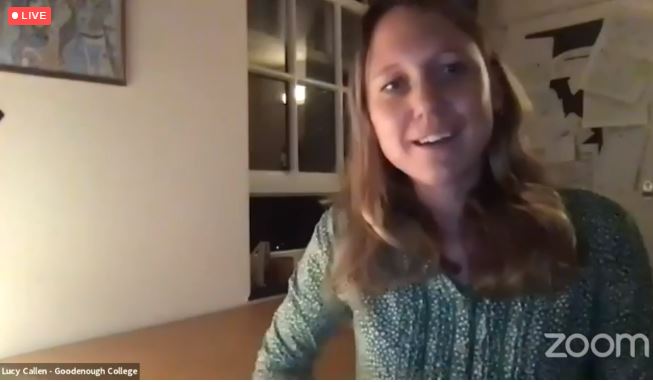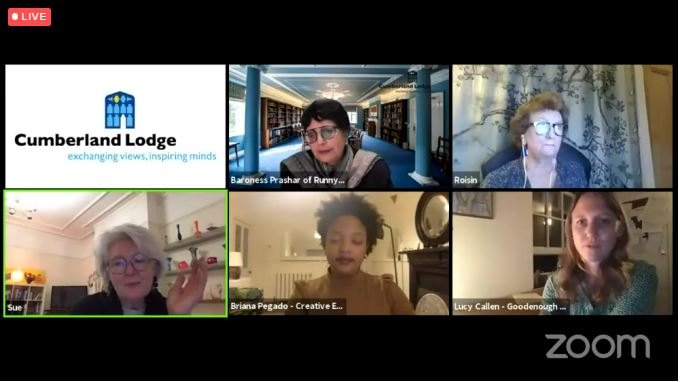On 5 November 2020, Cumberland Lodge hosted its Annual Debate in collaboration with Goodenough College, London, discussing the cultural bonds between the United Kingdom’s four nations and the role the arts can play in building social cohesion across the British Isles.
This year, unusually, the panel discussion took place online, due to restrictions on large gatherings during the COVID-19 pandemic.
This conversation was motivated by the need to explore how the pandemic and Brexit are affecting feelings of unity across the four nations. With renewed calls for Scottish independence and Irish unification, is the future unity of the UK at stake?
Throughout the evening, the conversation explored how national identities are expressed in the rich cultural heritage of the UK. In addition, the panelists debated the role of the arts in building bridges within and across communities.
Guest panellists
Four experts were invited to share their views: Lucy Callen, Roisin McDonough, Briana Pegado and Professor Sue Williams.
Lucy Callen is a composer and assistant conductor at the Horsham Symphony Orchestra. She is currently studying towards her Master’s degree at the Royal Academy of Music.
Roisin McDonough has been the Chief Executive of the Arts Council of Northern Ireland for 20 years. Throughout her career, Roisin has worked in central and local Government, as well as the community and voluntary sector, advocating for the importance of the arts in bringing communities together.
Briana Pegado is the Executive Director of Creative Edinburgh and a Co-Director of Creative Informatics, a programme supporting data-driven innovation in the creative industries. She has a background in sustainable development, founded the Edinburgh student arts festival, and co-founded a design consultancy helping clients re-engage with their creativity.
Professor Sue Williams is a course director at Swansea College of Art, University of Wales Trinity St David. As a practising artist, her work explores the role of women in the era of #metoo, feminine freedom, equality and assumed gender neutrality.
Art and UK history
The conversation was introduced by the session chair and Chair of Trustees at Cumberland Lodge, The Rt Hon Baroness Prashar of Runnymede, who asked the panelists to explore which issues divide the four nations and to what extent art has been used to address them.
Briana – bringing the Scottish perspective to the table – argued that historical divisions between Scotland and England can still spark feelings of oppression and misunderstanding today, and these play a part in the renewed discussions around Scottish independence. Concerns about an unfair distribution of resources across the UK, and lack of interest in understanding each other, is also helping to fuel a perceived divide.
Briana argued that art, as a platform, allows people to express themselves and can help with acknowledging shared histories, addressing issues that have been left unaddressed and starting honest conversations within communities.
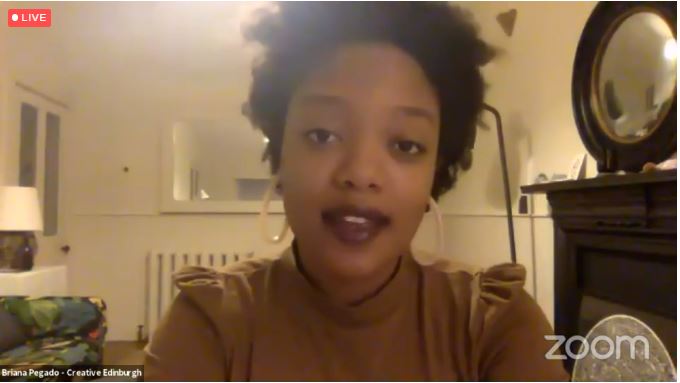
In support of this argument, Roisin shared examples of events she has run, with communities in Northern Ireland, to remove paramilitary murals of the past and replace them with more positive and welcoming forms of public art. She described how art knows no boundaries, is not constrained by national identities, and can help us talk to one another in a non-hostile, non-threatening way.
Art and the pandemic
While emergency funding has been made available to artists, in response to the Government-mandated lockdown, many artists and freelancers lost their income overnight and remain in a perilous financial position, unable to perform or express themselves creatively. At the same time, many people have realised just how important the arts and culture are for our mental health and sense of community.
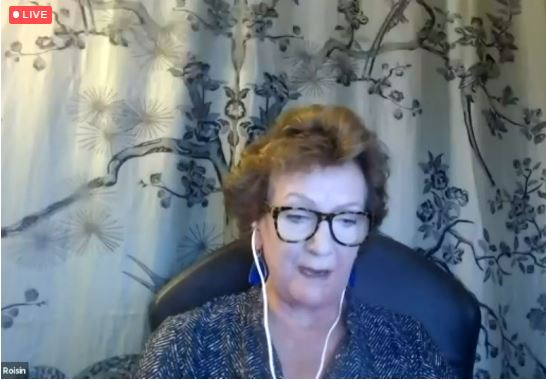
To challenge people’s way of thinking, Briana argued that, as part of the ‘new normal’ and as we seek to rebuild post-pandemic, we should consider artists as ‘essential workers’. Without human creativity, many inventions that we rely upon today would simply not exist. As a consequence, and to support the positive impact of art on communities, we need infrastructure and institutions that better support artists financially and allow young people to see creative professions as viable (and financially sustainable) career paths.
In addition, panellists argued, our education systems need to empower people to be creative and allow students to explore their creativity in the classroom, more than is currently possible.
Funding the arts in the ‘new normal’
An important audience question posed during the discussion related to how we might be able to secure funding to raise the impact and profile of the arts, post-pandemic. In response, Briana argued for more partnership projects between artists, the NHS, the elderly, and the health and social care sectors.
Such partnerships between artists and other sectors can showcase the power of knowledge sharing. In the context of the COVID-19 pandemic, art can also help us to process the grief, trauma and loss that we have collectively experienced during this past year.
Sue described how the Swansea College of Art has experienced a record number of applications, and a record intake of students wanting to study art, this academic year. This suggests that young people are increasingly interested in art as a way of expressing themselves in the tumultuous times of Brexit and the global pandemic.
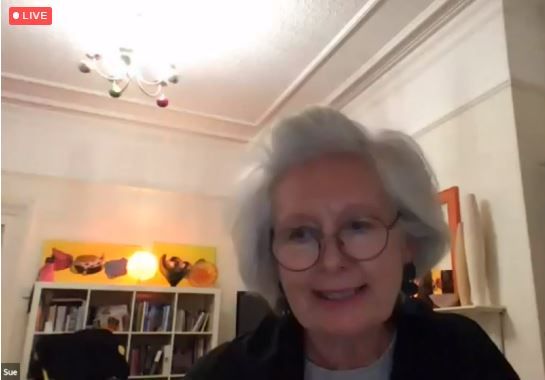
Art and identity
A recurring theme of the conversation was around using art to express one’s identity. While art is often used to depict local culture and individuality, Lucy highlighted that, especially in the light of Brexit, a fine balance should be struck between expressing individuality and expressing belonging to a group, if we are to maintain a sense of unity and cohesion.
This made me reflect about my own sense of identity and belonging as a German living in the UK. In the last eight years, I have spent time living on different continents and called different countries my home. I struggle to define my identity simply through my nationality, and from conversations with peers, I know that many young British people feel the same. Lucy concurred on this part; she felt more a citizen of the world than of a nation or a united kingdom of nations.
In my view, despite Brexit, we are and will remain a European family. Creativity and human ingenuity are not restricted by boundaries or borders. If we have learned one thing in 2020, it’s that we will always find ways to connect and art as a universal language will help us continue collaborating, regardless of where we were born or reside.
